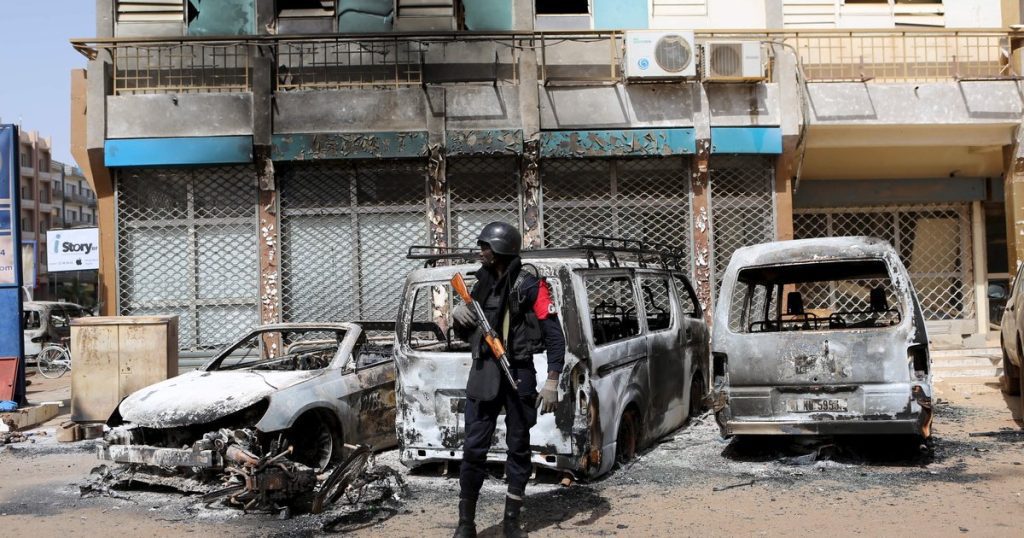In northern Côte d’Ivoire, thousands of refugees from Burkina Faso have fled their homes, escaping from two devastating threats: jihadist attacks and massacres committed by army-backed militias targeting the Fulani ethnic group.
Fleeing Terror and Massacres
One of the refugees, Ami G, recalls the night her village near Titao in northern Burkina Faso was attacked by armed militants.
“There was a baptism that day, and then gunshots erupted,” she explained. Ami and her six children fled on foot, leaving everything behind and walking for several days to reach safety.
The jihadists threatened to kill the women on their next visit and forced them to wear long black dresses. They accused villagers of collaborating with soldiers and even threatened children. After a grueling journey of over 600 kilometers, Ami found shelter in Ouangolodougou, a city in northern Côte d’Ivoire, where she now stays at the Niornigue asylum-seeker camp.
However, Ivorian authorities do not officially recognize them as refugees, leaving many in legal limbo.
A Wave of Brutality
Another refugee, Adama M, shared her story of survival after her home in Gorom-Gorom—a town near the borders of Mali and Niger—was looted by militants.
“They killed my aunt with a bullet to the head and kidnapped my older brother. They warned us not to cry,” Adama recalled. Her family traveled nearly 900 kilometers to reach safety in Côte d’Ivoire.
The conflict in Burkina Faso has escalated since 2015, with more than 26,000 deaths reported, including soldiers, militia members, and civilians, according to the Armed Conflict Location & Event Data Project (ACLED). An estimated two million people have been displaced by the violence.
The Role of Army-Backed Militias
In addition to jihadist violence, Burkinabe refugees are also fleeing from abuses committed by the Volunteers for the Defence of the Homeland (VDP). This militia, composed of civilians recruited by the army, was created to fight alongside military forces but has no official military status.
Since Captain Ibrahim Traoré seized power in a 2022 coup, the VDP has expanded its operations, targeting Fulani communities, many of whom are accused of collaborating with jihadists.
79-year-old Abdoulaye D, a Fulani man from Bobo-Dioulasso, recounted how his two sons were executed by men wearing military uniforms. His cattle were stolen, and Fulani people were rounded up and killed.
“There is no more Burkina for me,” Abdoulaye said angrily. “Even in death, I don’t want my body sent back there.”
Ethnic Targeting
The Fulani, traditionally semi-nomadic herders, have become victims of ethnic targeting. Accused of harboring jihadists, Fulani communities have suffered attacks from the VDP.
“In Burkina, if you are Fulani, people assume you are a jihadist. If they see you, you’re dead,” said Moussa T, another refugee.
The Niornigue camp, where many Fulani refugees now live, hosts a population that is 98% Fulani. Mossi people, the majority ethnic group in Burkina Faso, have generally avoided staying in the camp. One refugee explained that Mossi refugees left because they did not want to live alongside the Fulani.
“When they see them, they are reminded of jihadists,” she said. However, she expressed a different sentiment: “Living together is good—these people haven’t done anything to me.”
A Complex and Ongoing Crisis
The crisis in Burkina Faso reflects the deepening insecurity in the Sahel region. The conflict involves various armed groups, including factions aligned with Al-Qaeda and the Islamic State, alongside government-backed militias like the VDP.
While the Ivorian government has offered temporary shelter, the lack of official refugee status leaves many displaced people uncertain about their future. With ongoing violence in Burkina Faso, many refugees say they have no plans to return.
For survivors like Aminata S, whose entire family was massacred by the VDP, returning is not an option.
“They killed 31 people in three Fulani camps,” she said. “I don’t want to hear about Traoré or go back to Burkina.”
The refugees’ stories highlight the complicated dynamics of violence in Burkina Faso and the ethnic tensions that have intensified the conflict, forcing many to flee in search of safety across borders.



















